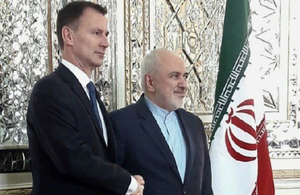Foreign Secretary visits Iran to raise nuclear deal, regional conflicts and consular cases
The Foreign Secretary travels to Iran to hold talks with the Iranian government.

Jeremy Hunt with Iranian Government
Foreign Secretary Jeremy Hunt will visit Iran for the first time on 19 November. He will hold talks with the Iranian government on the future of the nuclear deal, Iran’s role in the conflicts in Syria and Yemen, and the ongoing cases of detained British-Iranian dual nationals.
This week’s visit will be the first by a western Foreign Minister to Iran since the US withdrew from the Iran nuclear deal. The Foreign Secretary will meet Iranian Foreign Minister Zarif and other senior figures. He will stress that the UK remains committed to the nuclear deal as long as Iran sticks to its terms, and discuss European efforts to maintain nuclear-related sanctions relief.
The Foreign Secretary will also use his meetings to press Iran to improve its human rights record. In particular, he will call for the immediate release of detained British-Iranian dual nationals where there are humanitarian grounds to do so.
The Foreign Secretary will also discuss Yemen, and underline our deep concern at reports – documented by the UN Panel of Experts – that Iran has supplied ballistic missiles and weapons to the Houthis, in violation of Security Council Resolutions. This is destabilising and contrary to efforts to diplomatic efforts to end the conflict. At this point it is important that all countries support the UN Envoy’s efforts to convene talks between the parties in Stockholm.
Speaking ahead of the visit, Foreign Secretary Jeremy Hunt said:
More than anything, we must see those innocent British-Iranian dual nationals imprisoned in Iran returned to their families in Britain. I have just heard too many heartbreaking stories from families who have been forced to endure a terrible separation. So I arrive in Iran with a clear message for the country’s leaders: putting innocent people in prison cannot and must not be used as a tool of diplomatic leverage.
Of the Iran nuclear deal, he will say:
The Iran nuclear deal remains a vital component of stability in the Middle East by eliminating the threat of a nuclearised Iran. It needs 100% compliance though to survive. We will stick to our side of the bargain as long as Iran does. But we also need to see an end to destabilising activity by Iran in the rest of the region if we are going to tackle the root causes of the challenges the region faces.
Further information
-
Follow the Foreign Secretary on Twitter @Jeremy_Hunt and Facebook
-
Follow the Foreign Office on Twitter @foreignoffice and Facebook
-
Follow the Foreign Office on Instagram, YouTube and LinkedIn